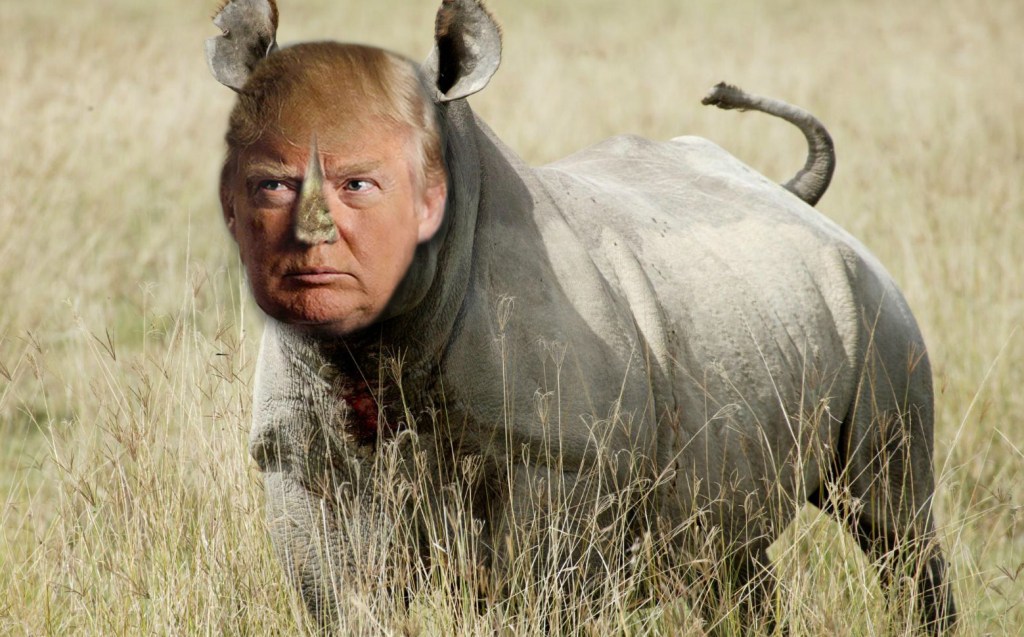By Arnold Dodge
Dorothy: “Your majesty, if you were king, you wouldn’t be afraid of anything?”
The Cowardly Lion: “Not nobody! Not no-how!”
The Tin Man: “Not even a rhinoceros?”
The Cowardly Lion: “Imposerous”
Many are baffled and appalled by the rise of Donald Trump as he vies for the Republican nomination for president. How did this happen? How can those who claim allegiance to the principles of the Constitution and the values of democracy follow someone who is bigoted, ill-informed, narcissistic and tyrannical in his pronouncements, someone whose hubris and grandiosity are unparalleled in public discourse?
Maybe Eugene Ionesco, playwright extraordinaire, can shed some light on the subject.
Written for the stage in 1960, Ionesco’s play Rhinoceros portrays a bizarre world slowly and inexorably overcome by an invasion of rhinos.
The play’s protagonist, Berenger, becomes the focal point of a maelstrom of fantastical proportions taking over his French village. A rhinoceros is spotted making its way through the quiet streets. The townspeople are flummoxed; then a second one is sighted. Suddenly rhinos are spotted all over town. Most astounding of all, citizens begin turning into rhinos, terrorizing their neighbors.
And the rhino numbers continue to rise.
Meetings are held to see what can be done. Some say the rhino invasion is a hoax made up by journalists to sell more papers. Some say the village residents are too intelligent to let the creatures take charge and change their way of life. Others deny the existence of the threat. Nevertheless, the siege continues. More and more rhino sightings are reported. More and more townspeople are morphing into the brutish creatures. Friends begin to attack friends. Before Berenger’s eyes, a friend grows a horn and his skin turns green.
And the rhino numbers continue to rise.
Townspeople—realizing that they cannot stop the changes—begin to see an inevitability in the new order. Those who have yet to be transformed suggest that the best way to deal with the situation is to understand the rhinos and, maybe, even experience the changes themselves. Others venerate the strength and force of these large mammals. Some believe that it is their individual right to make up their own minds about their associations. Others cannot bear to be an outsider when everyone else has joined the group. All resistance collapses. The townspeople have succumbed.
And the rhino numbers continue to rise.
The lone holdout, Berenger, keeps looking for signs to see if he is changing into the beasts that have ravaged his town. He promises himself that he will never give in to the transformation. He remains adamant; he refuses to conform.
Until he has doubts.
Maybe to be human is monstrous, he muses. He compares his body to the rhino’s body and laments, “My skin is so slack. I can’t stand this white, hairy body. Oh, I’d love to have a hard skin in that wonderful dull green colour—a skin that looks decent naked without any hair on it, like theirs!”
Berenger is ashamed of himself. He stands alone, forlorn, confused and self-hating.
But, at story’s end, Berenger resolves to fight for his individuality. He will remain strong. He will fight the menace that is robbing people of their humanity.
Story over.
What is the point?
In a Jan. 17, 1960, interview in Le Monde, Ionesco explains the message behind his work:
“I have been very much struck by what one might call the current of opinion, by its rapid evolution, its power of contagion, which is that of a real epidemic. People allow themselves suddenly to be invaded by a new religion, a doctrine, a fanaticism …. At such moments we witness a veritable mental mutation. I don’t know if you have noticed it, but when people no longer share your opinions, when you can no longer make yourself understood by them, one has the impression of being confronted with monsters—rhinos, for example. They have that mixture of candor and ferocity. They would kill you with the best of consciences.”
Which leads us to Donald Trump.
When we watch the cheering, adoring crowds in the stadiums, we are dumbfounded. With impunity, Trump attacks the president, his presidential primary opponents, women and minorities. Despite his target practice—or perhaps because of it—his fans promise more allegiance. The dedication to their standard-bearer seems to have no limits. Legions are pledging their support for him, joining his juggernaut, morphing into citizens unrecognizable to the rest of us.
And Trump’s national poll numbers continue to rise.
Some hold gatherings to discuss the changes. Many believe that the Trump followers are under some kind of spell. How else to explain their behavior? Can Trump actually win the Republican nomination…and maybe the presidency? Impossible, most critics say. A sophisticated nation would never elect the likes of a Donald Trump. Yet, as they look around, they hear more and more people echoing simplistic messages about toughness, strength and brute force. People, once thought reasonable, are joining the herd.
And the poll numbers continue to rise.
The crowds swell. There is hysteria unlike anything seen before at Trump rallies. His audience becomes unhinged when he delivers his self-serving remarks, sarcastic asides, absurd and unfounded declarations and abusive rants.
Those who are brave enough to challenge the speaker at a rally are subject to angry, vicious, even violent responses. In Trump’s words, maybe these protesters “need to be taken down.” Left to their own devices, it appears that the throngs will stampede and crush the dissenters.
And the poll numbers continue to rise.
When Trump speaks, raw energy is unleashed:
“There were people that were cheering on the other side of New Jersey, where you have large Arab populations. They were cheering as the World Trade Center came down.”
“Can you imagine that, the face of our next president I mean, she’s a woman, and I’m not supposed to say bad things, but really, folks, come on. Are we serious?”
“When Mexico sends its people, they’re not sending their best. They’re sending people that have lots of problems…they’re bringing drugs, they’re bringing crime. They’re rapists.”
“When was the last time anybody saw us beating, let’s say, China in a trade deal? They kill us. I beat China all the time.”
“I will build a great wall—and nobody builds walls better than me, believe me—and I’ll build them very inexpensively. I will build a great, great wall on our southern border, and I will make Mexico pay for that wall. Mark my words.”
“I think the only difference between me and the other candidates is that I’m more honest and my women are more beautiful.”
“If Hillary Clinton can’t satisfy her husband, what makes her think she can satisfy America?”
And how about this one? Here’s the narration in Trump’s newest campaign ad, which he’s reportedly spending $2 million a week to air: “…he’s calling for a temporary shutdown of Muslims entering the United States until we can figure out what’s going on.” In a statement posted prominently on his website he takes a firmer position: “Donald J. Trump is calling for a total and complete shutdown of Muslims entering the United States until our country’s representatives can figure out what is going on.”
And the poll numbers continue to rise.
Some may argue that Trump’s campaign is just filled with energized and passionate followers who want their candidate to win. On the other hand, others could argue that a rabid crowd is following a fanatic, hell-bent on the destruction of the constitutional foundations of our democracy. A “mental mutation” is occurring for all to see on the 24-hour news cycle. The whole town is talking about it and wondering what will come next. Like Ionesco’s rhino takeover, will we all succumb to the beast?
What can we do?
Ignore it? Laugh at it?
Or, get serious about the threat.
If we are not vigilant about attacks on our freedom, tyrannical forces will fill the void, with dire results for the community—and the country. If we are seduced by the power of tyranny, we too may become confederates in the fascist state.
Like Berenger, maybe we should promise not to capitulate, even if we find ourselves alone.
Like the Cowardly Lion, maybe we can summon what we most need:
Courage.
“All tyranny needs to gain a foothold is for people of good conscience to remain silent.” —Edmund Burke
Arnold Dodge, PhD, is an associate professor of education at the C.W. Post campus of Long Island University, where he serves as the Chairperson of the Department of Educational Leadership and Administration. Dr. Dodge is a former teacher, principal and superintendent. In his forty-fifth year in education, Dr. Dodge’s particular interest focuses on the effects of high-stakes testing on schools.


























